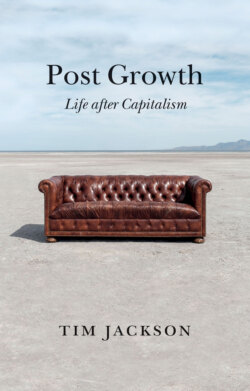Читать книгу Post Growth - Tim Jackson - Страница 16
‘Too much and for too long’
ОглавлениеOnly a few short minutes of Kennedy’s speech in Kansas were about the measurement problem of the GDP. Some of it was a visceral reaction to the rhetoric of war. ‘I don’t want to be part of a government, I don’t want to be part of the United States, I don’t want to be part of the American people,’ he said, ‘and have them write of us as they wrote of Rome: “They made a desert and they called it peace.”’
The underlying core of RFK’s political vision was a burning concern for social justice. He spoke passionately about the grinding poverty he had seen around him, corrupting the very heart of America. He spoke of children in Mississippi with distended stomachs, of Black ghettos with dismal schooling, of the long-term unemployed in the ex-mining communities of Appalachia, of rising suicide amongst indigenous people. ‘I don’t think that’s acceptable,’ he declared, ‘and I think the United States of America – I think the American people, I think we can do much, much better. And I run for the presidency because of that.’
It was a run he was never to finish. Shortly before midnight on 4 June 1968, the day of the California Primary, Kennedy gave his last speech in the Embassy Ballroom of the Ambassador Hotel in Los Angeles. It was the end of a long day in which he’d finally taken a definitive lead over his rivals. The mood was buoyant as he thanked his supporters for their help. The result would almost certainly have guaranteed him the Democratic nomination. But as he was making his way through the kitchen to a press conference on the other side of the hotel, he was shot three times at close range.
He fell to the ground immediately. A 17-year old hotel busboy with whom he had just shaken hands dropped to his knees to protect the Senator’s head against the cold concrete of the floor. Still conscious, Kennedy asked: ‘Is everyone ok?’ ‘Yes, everyone’s ok,’ replied the boy. The young waiter took a rosary he’d been carrying in his pocket and wrapped it round the Senator’s right hand. But it was already too late for prayers. One of the bullets had entered the skull just behind Bobby’s right ear and its fragments had done irreparable damage to his brain. He died just over a day later in the Good Samaritan Hospital.23
‘Too much and for too long,’ he told his Kansas audience a few short weeks before that tragic day, ‘we seem to have surrendered personal excellence and community values in the mere accumulation of material things’.
It was to be another four decades before this resounding critique of the myth of growth achieved any real purchase in politics. Strangely, what caused things to shift had as much to do with the economy itself as it did with the environmental and social limits to growth. The story of the unravelling of the myth of growth, as we shall see in the next chapter, is as much about the failings of capitalism as it is about the constraints of our finite planet.
